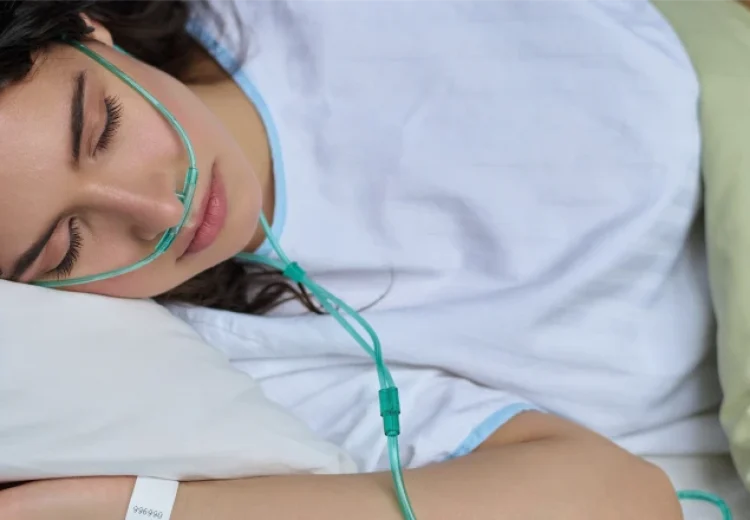Finding treatment for sleep apnea other than CPAP can seem like a daunting task. There are many reasons that you may be in search of ways of managing sleep apnea without CPAP including the uncomfortable nature of the CPAP mask resulting in discomfort and inadequate sleep. Luckily, there are non CPAP sleep apnea solutions.
What are the Alternatives to CPAP for Treating Sleep Apnea?
There are now many products that provide sleep apnea relief without CPAP including hypoglossal nerve stimulation. This form of treatment uses an implant to stimulate the nerve under the tongue to prevent the tongue from blocking your airways.
Additionally, certain lifestyle changes such as weight management and breathing exercises may help alleviate the symptoms of sleep apnea. Excessive weight can create fat deposits in the neck that block air flow so losing weight and improving your breathing provide significant sleep apnea relief without CPAP. Yoga therapy and meditation techniques can further this relief by helping you relax.
Another option to treat sleep apnea without CPAP are certain surgical options including surgeries on the naval cavities and jaw. However, if surgical options seem drastic to you, there are many other less invasive options to treat sleep apnea without CPAP including home remedies like tongue exercises that strengthen the tongue, improving tongue posture potentially reducing obstructive sleep apnea.
Herbal supplements including ginger and turmeric may have some effect on your breathing by reducing inflammation, allowing your airways to open and allow more efficient breathing. Acupuncture therapy is another option for apnea treatment without CPAP. Acupuncture therapy can strengthen your tongue and reduce inflammation.
How Effective are Oral Appliances Compared to CPAP for Sleep Apnea?
While CPAP is often the first treatment method tried for sleep apnea, it requires an expensive breathing machine and can cause many side effects including skin irritation, headaches, sinus infections, and general discomfort that interferes with your sleep quality. Oral appliances are sleep apnea devices other than CPAP that may be an alternative with less side effects.
Oral appliances, sometimes known as dental devices, work by repositioning your tongue or jaw to open up your upper airway. There are three main types of oral appliances: mandibular advancement devices, mouth guards, and tongue-retaining devices. Mandibular advancement devices work by pushing your lower jaw forward but can be uncomfortable and expensive.
Mouth guards also help to reposition your lower jaw, however, to a lesser degree than mandibular advancement devices. This sleep apnea fix without CPAP is less expensive and sometimes more comfortable. Finally, tongue-retaining devices work by holding your tongue forward and out of the mouth to help alleviate obstructive sleep apnea.
These devices tend to only be effective for people with mild sleep apnea and aren’t as effective as CPAP. Generally, these devices are only recommended by medical professionals for people with mild sleep apnea or people who can’t tolerate CPAP. Additionally, they have some side effects including dry mouth and oral discomfort.
What are other CPAP Alternatives?
Luckily, there are other options for sleep apnea treatment without CPAP or oral appliances. Nasal dilators are a device that is inserted into your nostrils, widening your nostrils, and allowing for greater airflow. However, one of the most promising sleep apnea fix without CPAP is positional therapy.
Positional therapy works by wearing a device around your abdomen that keeps you in the position of sleeping on your side. These types of devices are most effective for positional sleep apnea and offer more comfort and less side effects than CPAP devices and other sleep apnea treatments.
Zzoma is a positional therapy device that is an alternative to CPAP and is comfortable and affordable. Zzoma works to keep you on your side while you sleep, relieving positional sleep apnea symptoms without the discomfort of a CPAP device.

Consultation with Healthcare Professionals
If you are suffering from sleep apnea that is getting in the way of your life or if you are currently using a CPAP machine that is causing discomfort and interfering with your sleep, it is important to consult with a healthcare professional to learn about your options of no CPAP for sleep apnea
A doctor will be best able to determine what will help most to treat your sleep apnea. If you are diagnosed with positional sleep apnea, be sure to mention Zzoma. Zzoma is only available by prescription and your doctor can help determine if it will be effective for you.
FAQ
There are many options to reduce severe sleep apnea symptoms without CPAP including weight loss, breathing exercises, and oral appliances. If you have positional sleep apnea, positional therapy devices such as Zzoom can be incredibly helpful. Speak to your doctor about what treatment can be effective for you.
Oral appliances are an option to treat sleep apnea instead of CPAP but they may not be as effective and cause dry mouth and oral discomfort. For positional sleep apnea, positional therapy may be effective and more comfortable than CPAP or oral appliances. Zzoma is an affordable positional therapy device that can be prescribed by your doctor.
There are many benefits of treating sleep apnea without CPAP. It can reduce the discomfort caused by CPAP machines and allow you to sleep better, feeling more rested and ready to tackle the day when you wake up. Additionally, many alternatives to CPAP are more affordable. For positional sleep apnea, Zzoma offers these benefits and can help treat your symptoms and give you a better, more restful night of sleep.